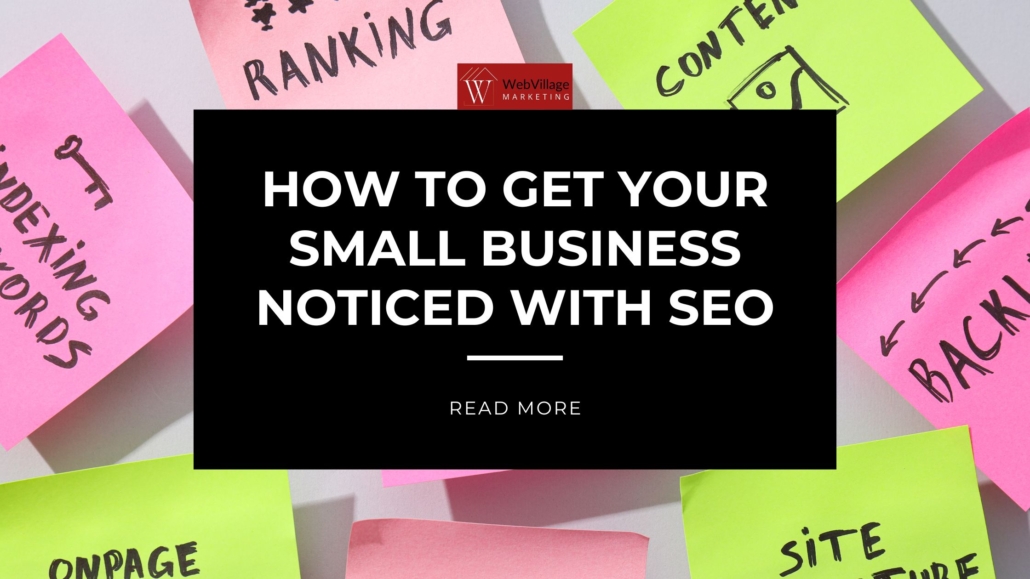- Strategic SEO helps small businesses earn long-term visibility by aligning content with user intent and search behavior.
- Local SEO builds community presence and drives high-intent traffic by optimizing Google profiles, location-based content, and directory consistency.
- WebVillage Marketing delivers customized SEO solutions that elevate small businesses in competitive search landscapes without relying on large ad budgets.
Visibility fuels growth. For small businesses, showing up where customers are already searching can be the key to long-term success. Whether you’re running a boutique, service company, or local shop, getting noticed online helps build credibility, attract new customers, and strengthen your brand.
Search Engine Optimization (SEO) is one of the most powerful tools for making that happen. Unlike paid ads, SEO helps your business earn attention by creating value organically and sustainably. It connects you with people who are already looking for what you offer, at the exact moment they need it.
With the right strategy, small businesses can rise in search rankings, compete with larger companies, and reach the right audience—all without overspending. This guide will walk you through practical, effective ways to make SEO work for your business, starting today.
Understand the Landscape: SEO Is a Long Game
Search engines are built to deliver the most relevant results to users. Their goal is not to favor brands with the most ad spend but to serve the content that best satisfies a query. That’s good news for small businesses. While SEO requires an investment of time and resources, the playing field is still accessible with the right approach.
Too often, business owners jump straight into tactics—loading pages with keywords, buying questionable backlinks, or launching thin blogs—without understanding how SEO works in today’s landscape. Modern SEO isn’t just about satisfying search engines. It’s about creating value for users and demonstrating credibility over time.
Google’s algorithms now rely on a mix of technical signals, content quality, user experience, and site performance. So, getting noticed online involves more than just being present—it requires you to earn your place through relevance, reliability, and usability.
Start with the Foundation: Your Website
Before any SEO efforts can take root, your website must be prepared to support them. Think of your site as your digital storefront. If it’s cluttered, slow, or confusing, visitors won’t stay, and Google will notice.
Start with these essentials:
- Mobile Optimization: Most searches now happen on smartphones. A site that looks clean and loads fast on mobile devices keeps both users and search engines happy.
- Site Speed: If your pages take more than three seconds to load, you’re likely losing visitors. Optimize images, streamline plugins, and use reliable hosting.
- Secure Connection: Google favors HTTPS sites. If your site still runs on HTTP, it’s time to update your SSL certificate.
This technical groundwork ensures that your site can be indexed, navigated, and trusted, which sets the stage for everything that follows.
Research That Drives Results: Keywords and Intent
Keywords remain a cornerstone of SEO, but today it’s not about volume—it’s about intent. Understanding why someone searches for a particular term is as important as the term itself.
Let’s say you run a local bakery. Ranking for “cakes” might sound appealing, but the competition is steep, and the intent could be too broad. On the other hand, “custom birthday cakes in Springfield” signals a buyer who’s actively looking for what you offer.
Use tools like Google Keyword Planner, Ubersuggest, or SEMrush to identify opportunities in your niche. Then, dive deeper:
- What questions are your customers asking?
- What problems do they want solved?
- What local modifiers (like city names or neighborhoods) are they using?
Optimizing for these long-tail keywords doesn’t just boost visibility. It attracts high-intent traffic that’s more likely to convert.
Optimize Every Page with Purpose
Once you know what keywords to target, it’s time to optimize your site’s content. But this doesn’t mean stuffing phrases awkwardly into paragraphs. It’s about weaving keywords naturally into content that answers questions, provides value, and builds trust.
Each page should have:
- A clear and relevant title (within 60 characters)
- A compelling meta description (under 155 characters)
- A readable URL (e.g., /custom-birthday-cakes)
- Headings (H1, H2, etc.) that organize content and include keywords
- Internal links to other pages on your site
But beyond technical formatting, the content itself must resonate. Your homepage, service pages, and blogs should all speak directly to your audience’s needs and expectations. Write like a guide, not a billboard. Speak plainly and confidently. Don’t just describe what you do—explain why it matters.
Content Strategy: Build Authority, Not Just Traffic
Blogs, guides, and FAQs are often used to draw search traffic, but too many small businesses publish content without a clear strategy. Posting just to post doesn’t help if the topics are vague or repetitive.
Instead, think of content as your chance to answer the questions your customers haven’t even thought to ask yet. This builds trust, keeps users engaged, and signals authority to search engines.
Ask yourself:
- What are the top concerns your customers mention during consultations?
- What misconceptions exist in your industry?
- Are there seasonal topics relevant to your business?
Write in-depth pieces that cover these themes. A plumbing company might write, “What to Do When Your Pipes Freeze,” while a boutique might write, “How to Build a Capsule Wardrobe for Spring.” These posts aren’t fluff—they offer real value and invite users to explore your services further.
Over time, this content builds a network of relevance across your site. And when paired with strong internal linking, it strengthens your SEO structure from the inside out.
Local SEO: Own Your Community
For many small businesses, your most valuable audience is local. This is where Local SEO becomes your secret weapon.
Start with your Google Business Profile. This free listing shows your business on Google Maps and local searches. But it only works when it’s fully optimized:
- Use a consistent business name, address, and phone number (NAP)
- Add high-quality photos of your products, services, or location
- Encourage and respond to customer reviews
- Keep business hours updated, especially during holidays or special events
Next, ensure your business is listed across reputable directories like Yelp, Bing Places, and industry-specific platforms. The more consistent your NAP information is across the web, the more credibility Google assigns to your business.
Local SEO also benefits from content that targets your region. Highlight local events, mention city names, or even showcase community involvement on your blog. These touches help you connect more deeply with nearby searchers and signal your relevance within a geographic area.
Build Links the Right Way
Links from other websites (backlinks) act like endorsements in Google’s eyes. The more quality links you have, the more authority your site gains.
But quality beats quantity every time. Skip the shady link farms or low-quality directories. Instead, focus on earning links organically by:
- Contributing guest posts to relevant blogs or industry publications
- Partnering with local businesses and featuring each other on your websites
- Getting featured in the local press or community blogs
- Creating shareable resources (like infographics or how-to guides)
Backlink building takes time, but each high-authority link builds your site’s trustworthiness in a way that advertising can’t replicate.
Measure, Adjust, Repeat
SEO isn’t a one-and-done process. Search behavior evolves. Algorithms update. Competitors change their strategies.
That’s why tracking performance is crucial.
Use Google Analytics and Google Search Console to monitor:
- Which pages get the most traffic?
- What search terms are bringing users in?
- How long do visitors stay on your site?
- Where do users drop off?
This data tells a story. It shows what’s working, what needs refining, and where new opportunities lie. If a blog post on “Spring Cleaning Tips” suddenly gains traction in April, consider updating it next year and linking it to related services. If a landing page has a high bounce rate, revisit the design or content.
Continual improvement is the essence of SEO success. Businesses that adapt quickly to signals from their users and the search engines will keep moving up the rankings.
Avoid These SEO Pitfalls
Many small businesses fall into traps that harm their SEO efforts without realizing it. These missteps include:
- Duplicating content across multiple pages: Search engines may flag repeated text as low-value or manipulative.
- Keyword stuffing: Overusing keywords makes content unreadable and harms rankings.
- Neglecting technical SEO: Broken links, missing alt tags, or unstructured URLs quietly sabotage your site’s visibility.
- Forgetting about user experience: If visitors can’t navigate your site easily or find what they need, they’ll leave quickly, and your rankings will reflect that.
Awareness of these mistakes helps you stay focused on strategies that actually move the needle.
The Long-Term Payoff
SEO won’t generate overnight leads or explosive social shares. But it does something more powerful: it creates a steady stream of visibility that compounds over time. Every page you optimize, every blog you publish, every review you earn—these are bricks in a foundation that supports sustainable growth.
For small businesses, that kind of consistent visibility is invaluable. You attract customers who are actively searching for what you offer. You build a digital presence that supports every other marketing effort—from social media to paid ads to in-store traffic.
And most importantly, you gain control. You’re no longer relying on referrals alone or competing solely on price. You’re being discovered, trusted, and chosen—because you’ve shown up where it counts and proved your value before anyone even called.
Final Thought
SEO doesn’t favor big budgets. It favors businesses that commit to relevance, clarity, and consistency. By investing in quality content, optimizing your site’s foundation, and understanding what your customers really need, you give your business the best chance to stand out and stay visible for the long haul.
Need help building a strategy that fits your small business? At WebVillage Marketing, we offer smart SEO solutions tailored to your goals and audience.
Contact us and let’s build your visibility, one click at a time.








